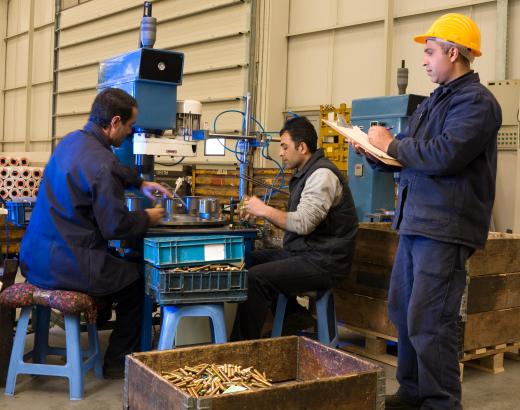Machinability is a quality that typically indicates the relative difficulty involved in working a material. A material with good machinability is usually easy to cut or work with, does not cause excessive wear to the tools that are used on it, and accepts a finish without excessive effort. When a material has all of these qualities, it is often referred to as free machining. One downside that is often inherent in free machining materials is that they may suffer in terms of performance and wear. Advances in engineering can improve tool design to increase the machinability of materials that also offer high performance.
The process of determining the machinability of any given material can be fairly complex. Many factors may be considered, such as the physical qualities of the material and the condition and properties of the cutting machinery. Factors such as tensile and yield strengths, hardness, and microstructure can all be important. Typically, materials with high tensile and yield strengths will offer high performance but also be difficult to machine. Certain metalworking tools may also offer benefits that can result in a particular material being easier to machine.

Since such a number of variables can have an effect on how machinable a material is, individual assessments are typically done for each job. Several different methodologies can be used to determine whether a material will be free machining, including ones that estimate tool life, determine how much power will be consumed, or relate to surface finishing. Tool based assessments usually hinge on what type of cutting devices will need to be used or how quickly they will tend to wear out. Surface finish methods typically involve determining how easily a material will accept a finish.
In order to give a general idea of how difficult certain materials can be to machine, machinability ratings may be available. One system might assign a value of 100% to a particular type of steel, effectively making it a standard that others can be judged by. In a system like this, materials with a rating of under 100% would be difficult to work, while those with substantially higher percentages might be considered free machining.
A number of different techniques can be used to improve machinability, typically by either altering the material or the cutting process. Some types of steels can be considered free machining, while other low carbon steels can be soft and difficult to work. Aluminum is another material that can be easier to work depending on its makeup, as certain alloys are made intentionally more brittle for this purpose. Other materials, such as thermoplastics, may be easier to machine with equipment that includes lubricating coolant, while rubber is typically worked using liquid carbon dioxide or other low temperature coolants.
